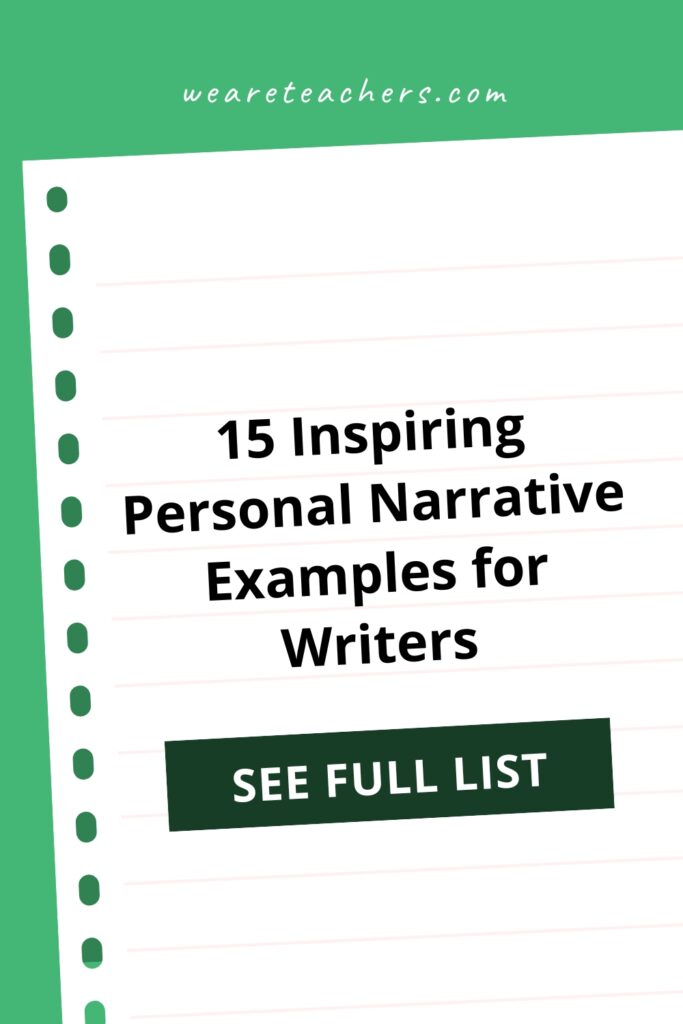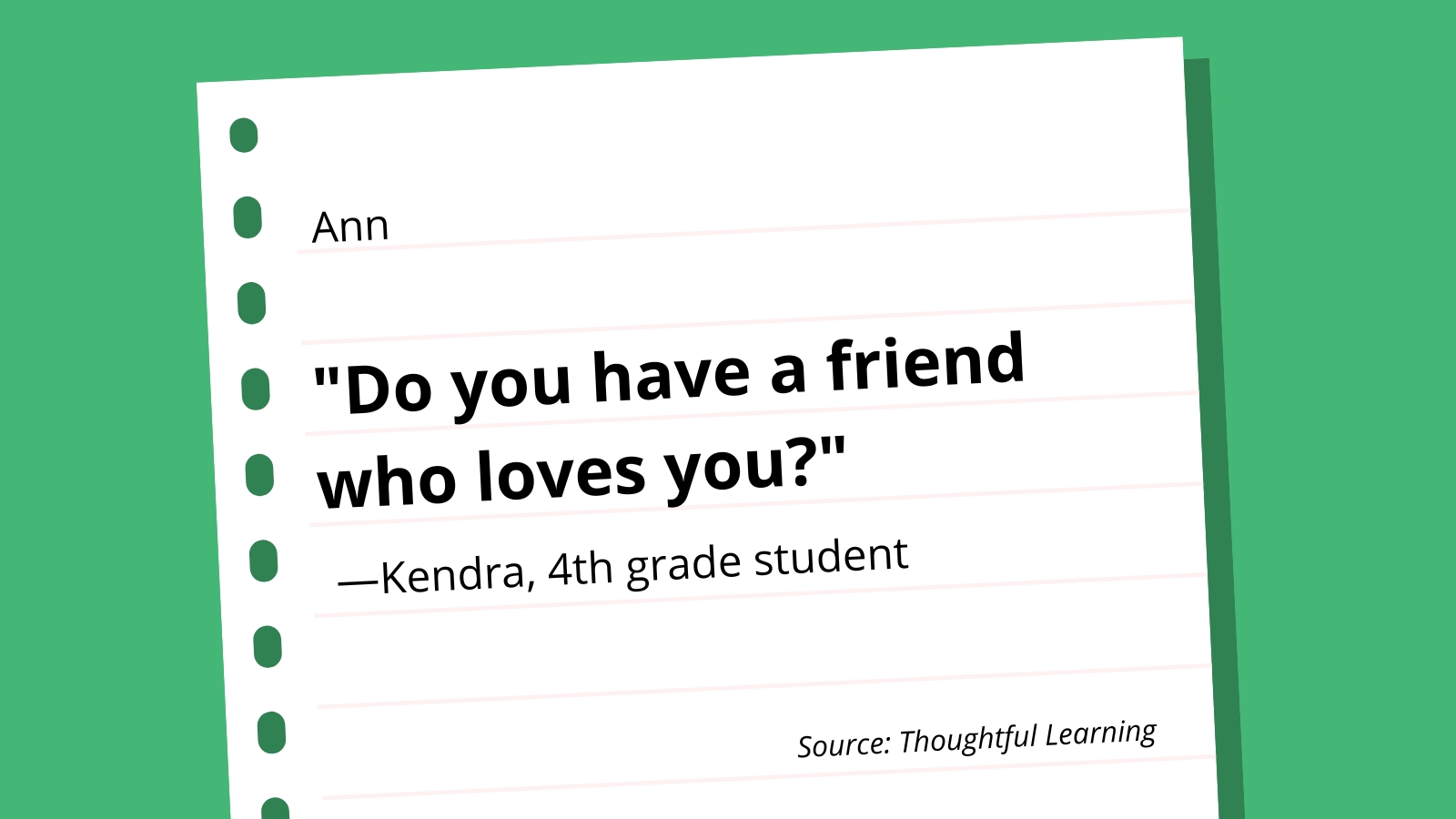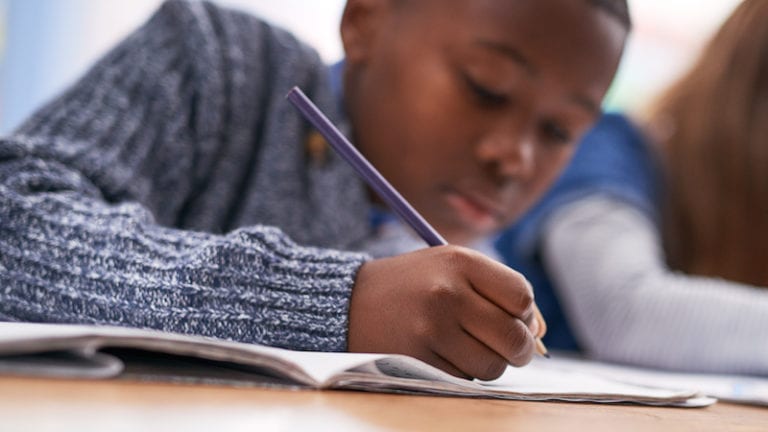Students start writing personal narratives at a young age, learning to use descriptive language to tell a story about their own experiences. Try sharing these personal narrative examples for elementary, middle, and high school to help them understand this essay form.
What is a personal narrative?
Think of a narrative essay like telling a story. Use descriptive language, and be sure you have a beginning, middle, and end. The essay should recount your personal experiences, including your thoughts, feelings, and actions.
Learn more about personal narrative essays here:
- What Is Narrative Writing, and How Do I Teach It in the Classroom?
- Engaging Personal Narrative Ideas for Kids and Teens
- Best Mentor Texts for Narrative Writing in Elementary School
Elementary School Personal Narrative Examples
In elementary school, personal narratives might be quite short, just a paragraph or two. The key is to encourage kids to embrace a personal style of writing, one that speaks in their own voice. Take a look at these elementary school personal narrative essay examples for inspiration.
The Horrible Day
“Next I fell asleep in my cereal and my brother stole my toast!”—Anonymous student
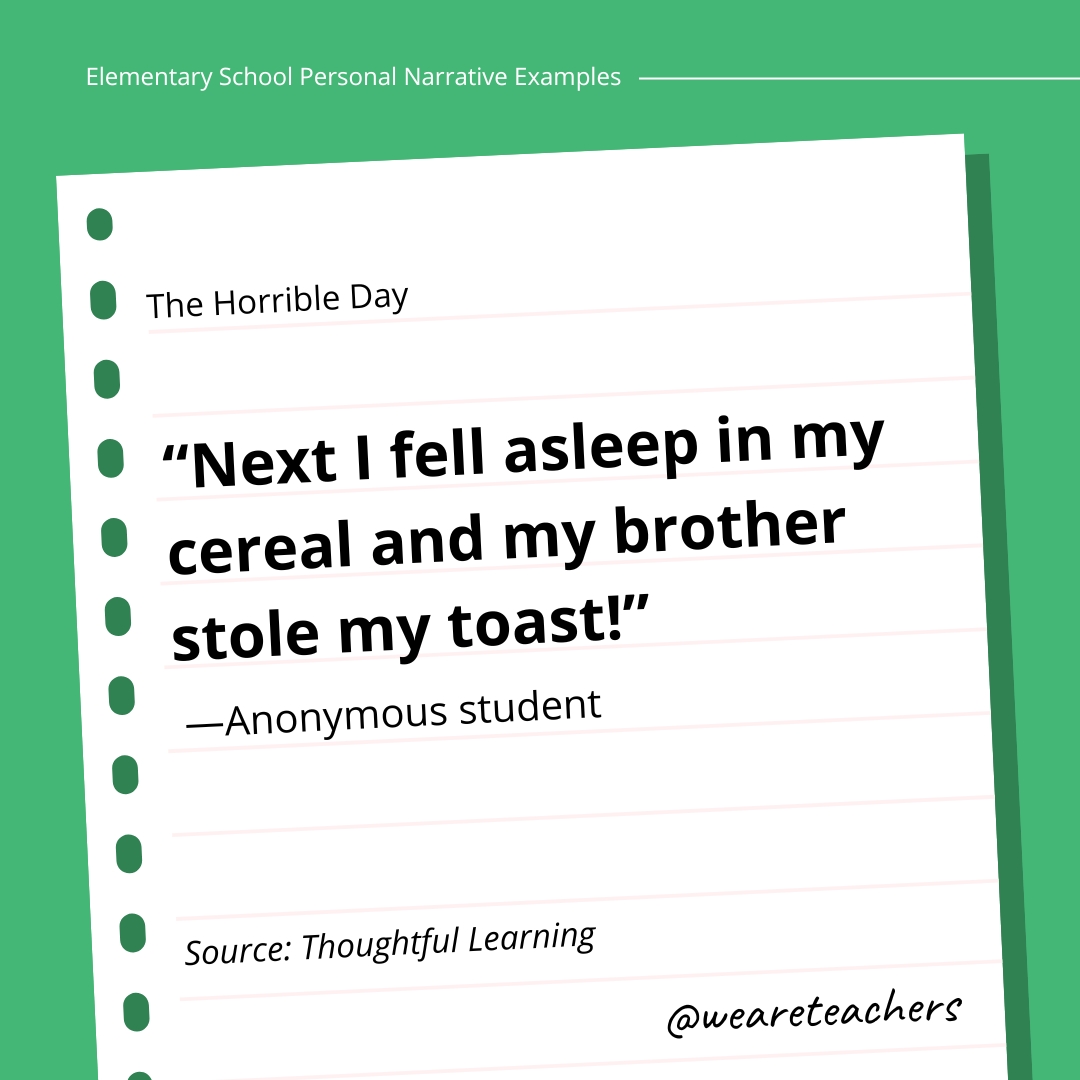
In this short personal narrative written by a 2nd grader, the author describes a bad day with lots of details and an informal tone. It’s a great model for your youngest writers.
Read the full essay: The Horrible Day at Thoughtful Learning
Keep an Eye on the Sky!
“As we made our way out to the field, my stomach slowly turned into a giant knot of fear.” —Anonymous student
Any student who dreads gym class will connect with this essay, which turns a challenge into a triumph. This narrative from Time for Kids is annotated, with highlighted details and tips to help kids write their own essay.
Read the full essay: Keep an Eye on the Sky! at Time for Kids
Grandpa, Chaz, and Me
“I really miss Grandpa, and so does my brother, even though he never met him.” —Cody, 4th grade student
Written by a 4th grader, this essay relates the author’s loss of a grandfather at a very young age. Using simple, personal language, they tell a compelling story in a few short paragraphs.
Read the full essay: Grandpa, Chaz, and Me at Thoughtful Learning
Surviving an Embarrassing Situation
“I had made the shot in the wrong basket, giving the Green Shirts the win!” —Anonymous student
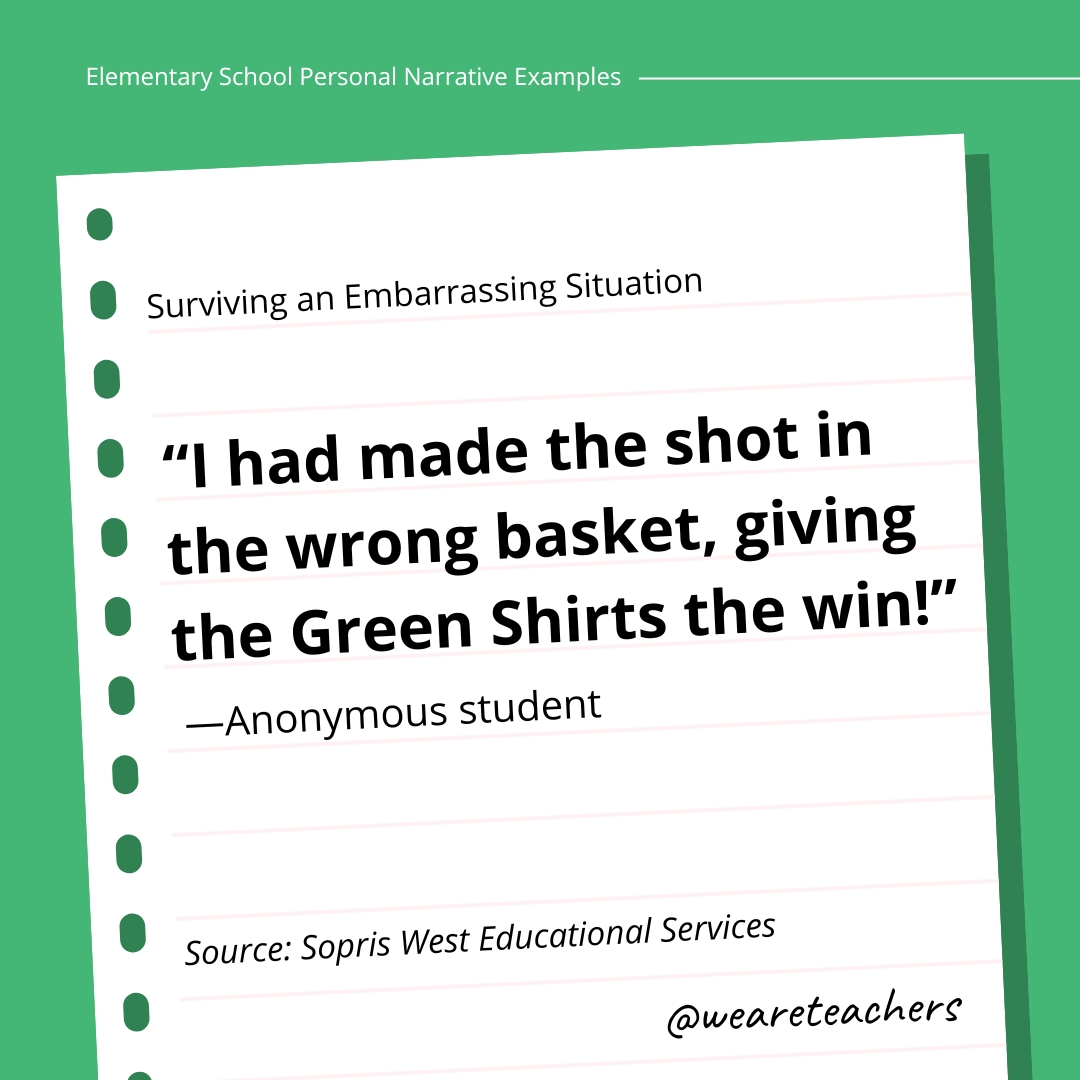
Personal narratives tell a story, with a beginning, middle, and end. This annotated essay outlines those parts, making it easier for young writers to do the same in their own writing.
Read the full essay: Surviving an Embarrassing Situation at Sopris West Educational Services
Ann
“Do you have a friend who loves you?” —Kendra, 4th grade student
Writing about friends gives writers the chance to describe someone’s physical characteristics and personality. This 4th grade essay uses personal details to bring a beloved friend to life.
Read the full essay: Ann at Thoughtful Learning
Middle School Personal Narrative Examples
By middle school, personal narratives are longer and more involved, telling more detailed stories and experiences. These middle school personal narrative essay examples model strong writing skills for this age group.
The Climb
“As thoughts of certain death run through my mind, the world appears a precious, treasured place.” —Amy, student
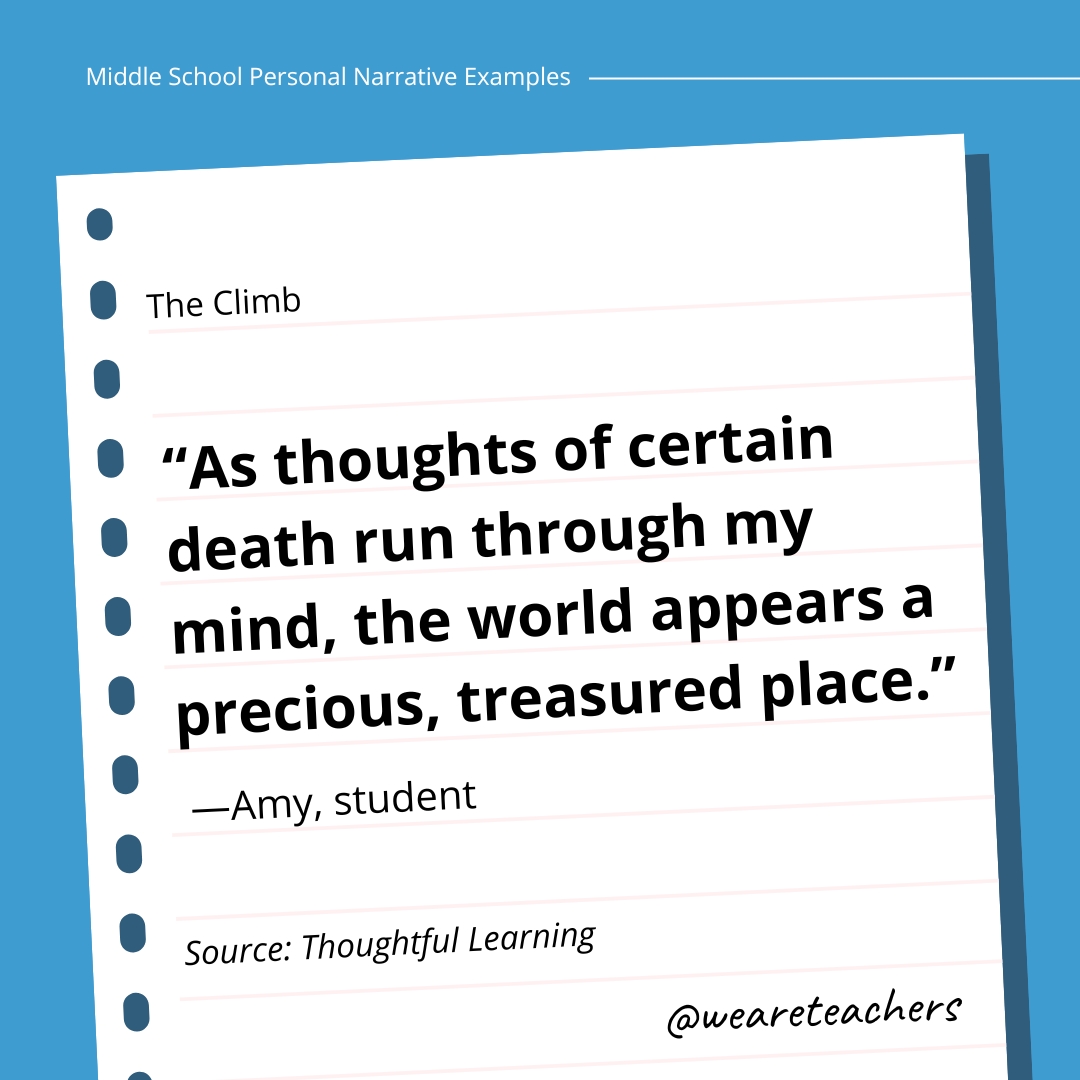
Describing an opportunity to overcome your worst fears makes an excellent personal narrative topic. The vivid descriptions of the landscape and the author’s feelings help the reader make a strong connection to the author.
Read the full essay: The Climb at Thoughtful Learning
The Best Friend Question
“I’ve often wondered, does not having a best friend make me defective?” —Blanche Li, age 13, Diablo Vista Middle School, Danville, California
When her Spanish teacher asked students for an essay describing their best friend, 13-year-old Blanche Li fell back on her standard story: that of a made-up person. Here, she explains why she made up “Haley” and wonders what having an imaginary best friend says about her.
Read the full essay: The Best Friend Question at The New York Times
The Racist Warehouse
“I didn’t know racism was still around; I thought that situation had died along with Dr. King.” —Alicia, 8th grade student
Strong personal narratives often relate the way the author learned an important life lesson. Here, an 8th grader describes her first experience with racism, in an essay that will sadly ring true with many readers.
Read the full essay: The Racist Warehouse at Thoughtful Teaching
RV Journey
“For the first time, we realized that we didn’t know how to express our voice, and we always suppressed it.” —Jocelyn C., 7th grade student, Texas
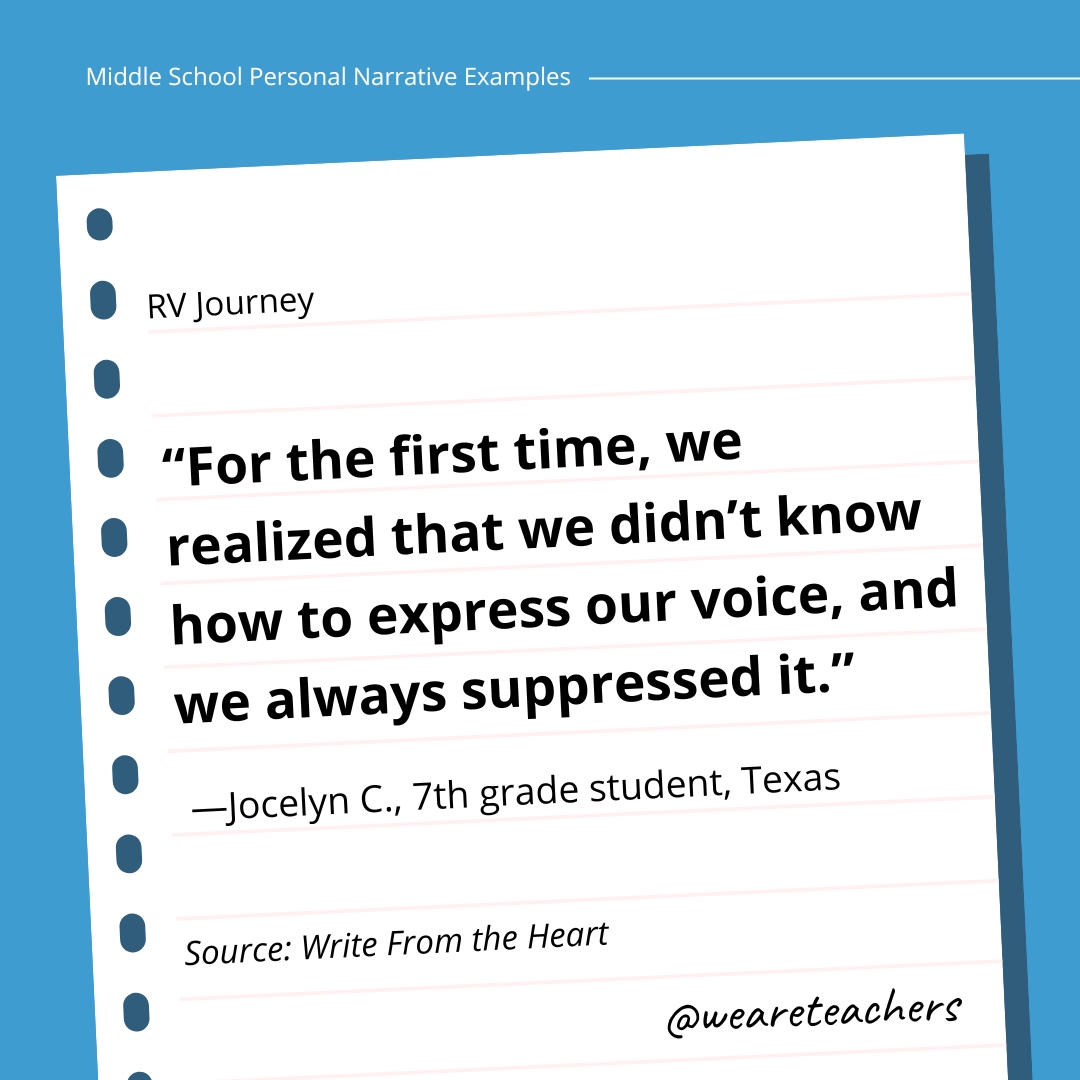
Seventh-grader Jocelyn C. describes the unique experience of spending two years living in an RV with her family, traveling the country. She relates the ups and downs of their trip, illustrating the way her family learned to live together in close quarters and embrace the adventure.
Read the full essay: RV Journey at Write From the Heart
An Eight Pound Rival
“I’m trying to accept that he didn’t mean to dominate the center stage all the time, that’s just one of the many lovable assets of his personality.”
A new sibling can change everything in a family, especially when you’ve always been the baby. This middle schooler explains her challenging relationship with a little brother that she loves, even when he drives her a bit crazy. (Find this essay on page 42 at the link.)
Read the full essay: An Eight Pound Rival at Teaching That Makes Sense
High School Personal Narrative Examples
High school students have more complex stories to tell, though they’re sometimes reluctant to do so. Reading personal narrative essay examples like these can encourage them to open up and get their thoughts, feelings, and ideas down on the page.
Sorry, Wrong Number
“When I received the first text, I was a playful sixth grader, always finding sly ways to be subversive in school and with friends.” —Michelle Ahn, high school student
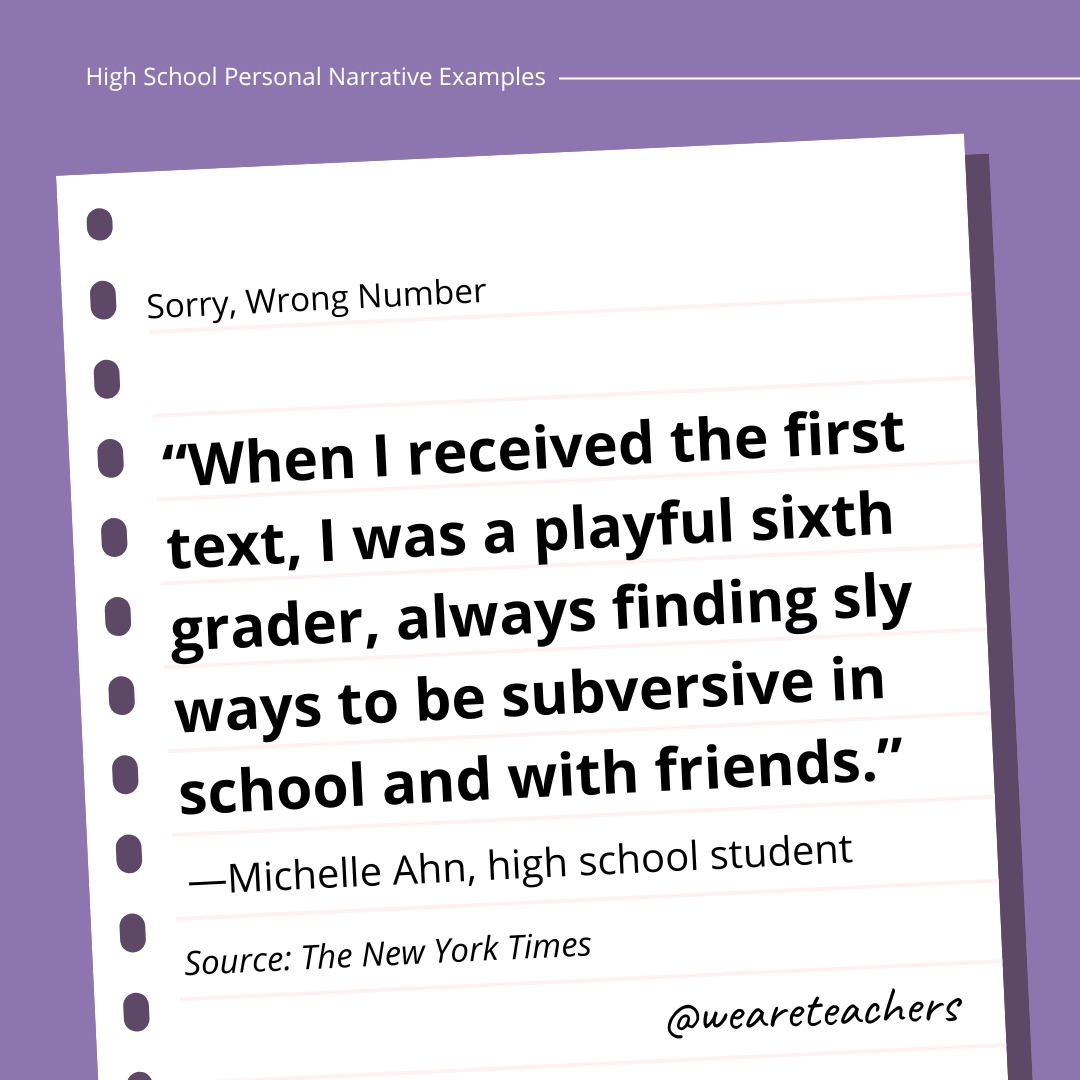
When Michelle Ahn was 11, she started getting texts for a wrong number, a man named Jared. Rather than correcting the error, she spends the next few years occasionally engaging with his texters as “Jared,” learning more about him. Though she finally comes clean, her time as “Jared” exposes her to a way of life very different from her own, and opens her eyes to the inner lives of others.
Read the full essay: Sorry, Wrong Number at The New York Times
Caught in the Net
“Little does everyone else know how often I’m not doing school research or paper writing; instead I’m aimlessly writing emails or chatting with Internet friends and family hundreds of miles away.” —Kim, college student
Even before social media and smartphones swept the world, internet addiction had become a problem. Here, a student shares her experiences in AOL chat rooms, meeting people from around the globe. Eventually, she realizes she’s sacrificing life in the real world for her digital friends and experiences, and works to find the right balance.
Read the full essay: Caught in the Net at Thoughtful Learning
Nothing Extraordinary
“An uneasy feeling started to settle in my chest. I tried to push it out, but once it took root it refused to be yanked up and tossed away.” —Jeniffer Kim, high school student
During an ordinary shopping trip, high schooler Jenniffer Kim suddenly realizes she’s ashamed of her mother. At the same time, she recognizes all the sacrifices her mom has made for her, and gladly takes the chance to make a tiny sacrifice of her own.
Read the full essay: Nothing Extraordinary at The New York Times
The Pot Calling the Kettle Black
“At this point in life, I had not yet learned to be gentle with myself, or others.” —Anonymous student
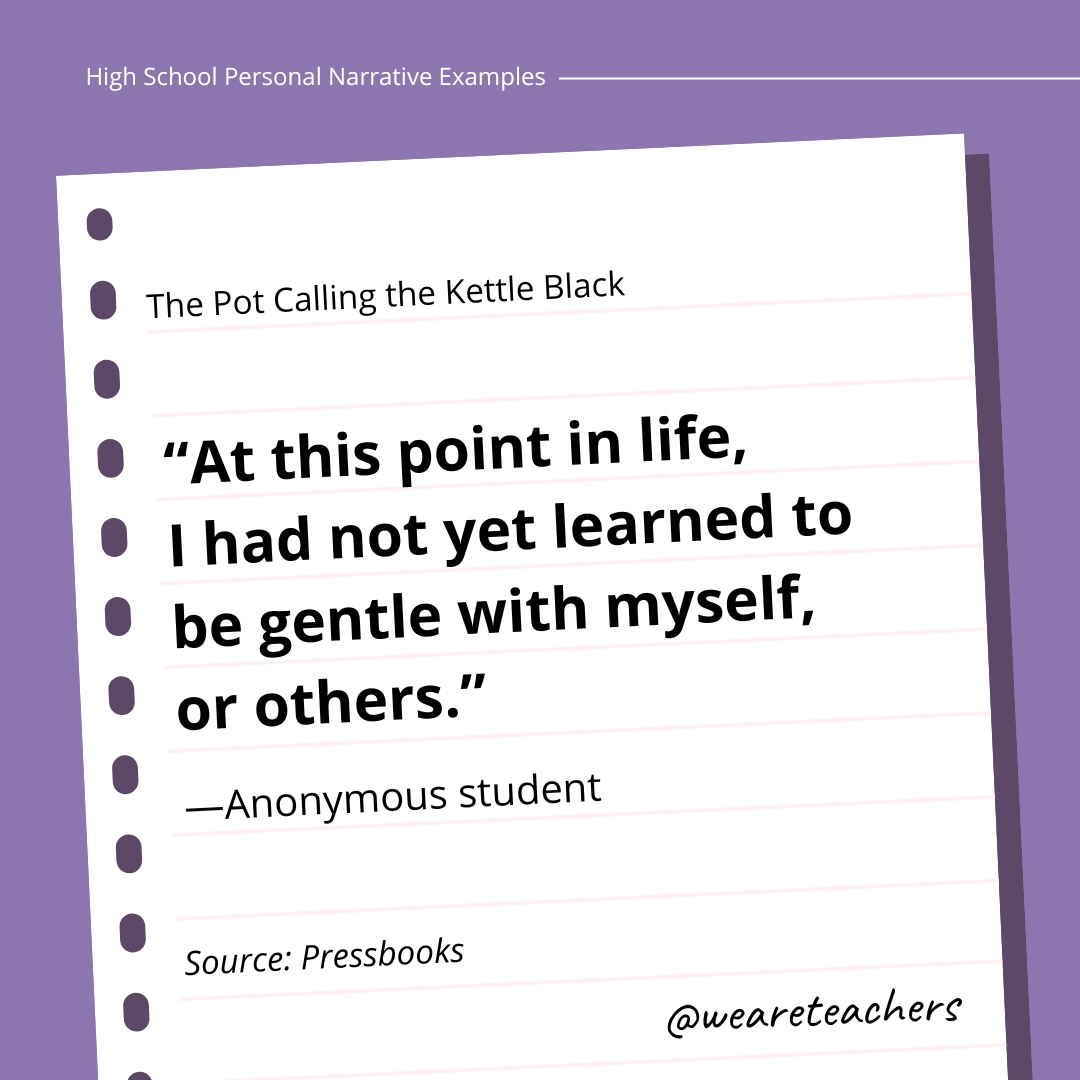
A teen who lives with bipolar disorder recounts a difficult conversation with her parents, in which her mother dismisses her as “crazy.” A few years later, this same teen finds herself in the emergency room, where her mother has just tried to die by suicide. “Crazy!” the daughter thinks. After her mother also receives a bipolar disorder diagnosis, the author concludes, “‘Crazy’ is a term devised to dismiss people.”
Read the full essay: The Pot Calling the Kettle Black at Pressbooks
What a Black Woman Wishes Her Adoptive White Parents Knew
“I know that I am different, but do not have the words to understand how.” —Mariama Lockington
Though not written by a high schooler, this essay by Mariama Lockington makes an excellent mentor text for this age group. Lockington dives deep into her feelings about being adopted by parents of a different race, and shares her challenges in poignant language that speaks directly to the reader.
Read the full essay: What a Black Woman Wishes Her Adoptive White Parents Knew at Buzzfeed News
Do you use personal narrative examples as mentor texts in your classroom? Come share your experiences and ask for advice in the We Are Teachers HELPLINE group on Facebook!
Plus, Strong Persuasive Writing Examples (Essays, Speeches, Ads, and More).
